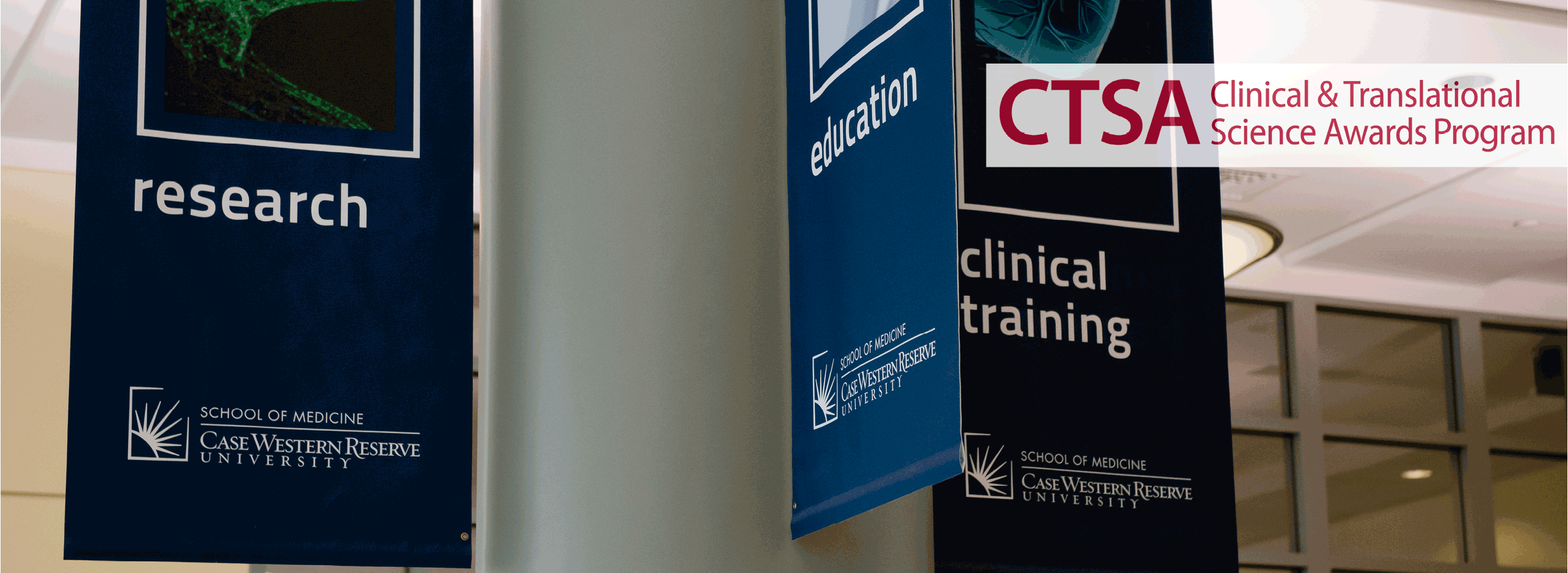Welcome to the Clinical and Translational Science Collaborative
The Clinical and Translational Science Collaborative (CTSC) of Northern Ohio, a collaborative among Case Western Reserve University and its affiliated hospital systems, the Cleveland Clinic, MetroHealth, University Hospitals, VA Northeast Ohio Healthcare System, Northeast Ohio Medical University, and the University of Toledo.
Our Mission: The Clinical and Translational Science Collaborative of Northern Ohio aspires to be a catalyst for high quality clinical and translational science and transformative research to positively impact the health of those in Northern Ohio and beyond.
Translational science focuses on the scientific and operational principles underlying each step of the translation process—understanding these processes, identifying effective approaches, and removing barriers speeds the adoption of best practices into community settings and helps bring more treatments to more people more quickly. For nearly 18 years, the CTSC, supported principally by NIH funding, has enhanced the quantity and quality of clinical and translational science among our partners by facilitating novel research paradigms, technologies, and training. Our CTSC has developed a new generation of researchers, enhanced collaborations among investigators, streamlined discovery by building partnerships among industry and community and organizational partners, and facilitated many successful entrepreneurial startups.
In the 2023-2030 grant cycle, our CTSC is focusing particularly on including the community in the process of clinical and translational research. We will work to improve broad participation in clinical trials so that the results will be broadly applicable and can be widely accepted in the communities we serve and develop new strategies for implementation. We will train a robust workforce at all levels (including community liaisons) who represent the community as well as academia. We are determined that everyone in Cleveland—and beyond—should benefit from advances in CTS in our programs and discoveries. In order to achieve this goal and improve health in all our communities, we are restructuring our CTSC activities for the upcoming funding cycle, redirecting our focus and goals around our community around the theme: “Catalyzing Linkages for Everyone's Health,” or “CLE Health”.
The CTSC of Northern Ohio has created a solid foundation to ensure rigorous and innovative training of the clinical and translational workforce, to accelerate the translation of discoveries to patients, to improve the health of Northern Ohioans, and to provide scalable models for others throughout the nation. To realize its vision, the CTSC of Northern Ohio proposes to engage all C/T science stakeholders, the workforce, patients and community members to collaborate locally, regionally, and nationally, to
- identify the fundamental barriers to broad representation in research of all groups, and innovate, test and disseminate interventions aimed at breaking down these barriers,
- facilitate and expedite innovation in multicenter clinical and translational research by fully integrating researchers and community collaborators to ensure that our research results in health improvements for all,
- disseminate and implement findings from novel and responsive research programs across clinical and community settings to advance access to health interventions that aim to improve health outcomes,
- create and disseminate high impact educational and training programs for translational research professionals of all disciplines and levels, both in clinical and community settings.
Commitment to collaboration and innovation in translational science remain top priorities as the CTSC implements its aims and builds the new iteration of the Clinical and Translational Science Collaborative of Northern Ohio.
The Clinical and Translational Science Collaborative of Northern Ohio is funded by the National Institutes of Health, National Center for Advancing Translational Sciences, Clinical and Translational Science Award (CTSA) Program which supports a national network of over 60 medical research institutions — called hubs ― that work together to improve the translational research process to get more treatments to more patients more quickly. The hubs collaborate locally and regionally to catalyze innovation in training, research tools and processes. The CTSA Program is designed to develop innovative solutions that will improve the efficiency, quality and impact of the process for turning observations in the laboratory, clinic and community into interventions that improve the health of individuals and the public.


